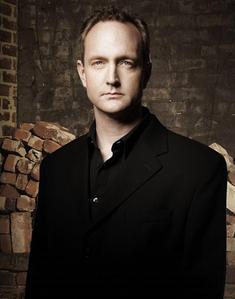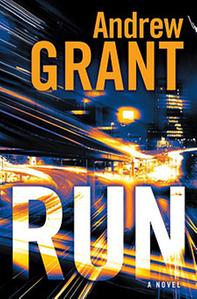
|
|
| photo: Carrie Schechter | |
Born in Birmingham, England, in 1968, Andrew Grant studied English literature and drama at the University of Sheffield, then set up and ran a small independent theater company that showcased a range of original material to local, regional and national audiences. Following a critically successful but financially challenging appearance at the Edinburgh Fringe Festival, Grant moved into the telecommunications industry as a "temporary" solution to a short-term cash crisis. He escaped corporate life 15 years later and published the David Trevellyan series of novels (Even, Die Twice and More Harm Than Good). Run (Ballantine Books, October 7, 2014) is a stand-alone thriller. Grant is married to novelist Tasha Alexander and lives in Chicago, Ill.
On your nightstand now:
Why We Build by Rowan Moore; Mies van der Rohe by Franz Schulze and Edward Windhorst; The Sinner by Tess Gerritsen; Hanging Hill by Mo Hayder; and The Railway Man by Eric Lomax.
Favorite book when you were a child:
Watership Down by Richard Adams, the book I've reread more times than any other. My original copy from 1978 is still on my shelves, jammed between Douglas Adams and Isaac Asimov, coverless, and faded almost to the point of illegibility. Once I overcame my disappointment at the lack of the sunken ship that the title seemed to promise, I found it had everything I could possibly want from a story: a great cast of characters (okay--rabbits), a healthy disregard for established authority, courage, danger, camaraderie, self-sacrifice, cunning, refusal to surrender regardless of the consequences (an essential ingredient for anyone with Irish blood) and the heroes' ultimate triumph against overwhelming odds.
Your top five authors:
A tough question to answer. If pressed, I'd say the five authors who have had the greatest impact on me personally and professionally would be Arnold Lobel, Alistair MacLean, George Orwell, William Shakespeare and Samuel Beckett.
Book you've faked reading:
None. I learned to read quite early, and when I started school in Birmingham, I quickly worked my way through nearly all the books in the (rather small) class library. When I was six, my family moved to a town much closer to London, and on my first day at my new school the teacher asked which of the books in that class's library I'd read. My answer: none. Her conclusion: that I was illiterate. Unable to conceive the possibility that a school 150 miles away may have had a different selection of books on its shelves--and unwilling to listen to my explanation--she tried to banish me to the year group below. Her attempt was unsuccessful, but it left me with a lifelong aversion to people who judge you based on what you haven't read, rather than what you have.
 Book you're an evangelist for:
Book you're an evangelist for:
The Miernik Dossier by Charles McCarry. I've always been fascinated by different ways of telling stories, and the way McCarry weaves an intricate, multilayered tale through a set of "documents" rather than a traditional narrative is nothing short of brilliant.
Book you've bought for the cover:
I bought John Dies at the End by David Wong for the title. Does that count?
Book that changed your life:
Ice Station Zebra by Alistair MacLean. This is the book that marked my growing-up as a reader, and the one that's more responsible than any other for me wanting to become a thriller writer myself. One of my most prized possessions is a first edition that my wife bought me a couple of years ago, but I first read it in 1978 or '79, thanks to the grade-school teacher I had at the time. One day he caught me with a book under my desk--probably Watership Down--which I was using to distract myself from the mind-numbingly dull projects he used to waste the class's time with, and the sight of it set him off on a bizarre rant: "You think you're a good reader, do you, Grant? Well let me tell you: You're not. Not if that's all you can manage. That book's for babies. You're not a good reader unless you can go to any bookcase, anywhere, pick up any book, and read it without thinking." Read without thinking? A strange concept, you might say. But I wasn't concerned about that, back then because his words had struck me as a challenge. So that night I approached my father's bookshelves and took down the first book my hand fell upon. Somewhat nervously I looked at the title. "Sweet!" I thought, feeling relieved. "There are stations on the ice? And they have zebras at them? This is going to be fun!" And it was.
Favorite line from a book:
"All animals are equal, but some animals are more equal than others." From George Orwell's Animal Farm. Even at a young age, I tended to view the world through the contradictory lenses of hopeless naivety and miserable cynicism, so this book--which so elegantly demonstrates how the best of intentions can lead to the worst of outcomes--made me feel like I wasn't totally out of touch with human nature after all.
Which character you most relate to:
Bernard Samson in the Game, Set & Match, Hook, Line & Sinker and Faith, Hope & Charity trilogies by Len Deighton.
Book you most want to read again for the first time:
Red Dragon by Thomas Harris. Near the beginning of the book, Harris unveils a perplexing crime scene through the eyes of FBI profiler Will Graham, and the moment it becomes clear why the killer arranged things the way he did literally sent a shiver down my spine.

